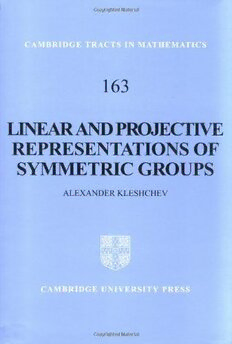Download Linear and Projective Representations of Symmetric Groups PDF Free - Full Version
Download Linear and Projective Representations of Symmetric Groups by Alexander Kleshchev in PDF format completely FREE. No registration required, no payment needed. Get instant access to this valuable resource on PDFdrive.to!
About Linear and Projective Representations of Symmetric Groups
The representation theory of symmetric groups is one of the most beautiful, popular, and important parts of algebra with many deep relations to other areas of mathematics, such as combinatorics, Lie theory, and algebraic geometry. Kleshchev describes a new approach to the subject, based on the recent work of Lascoux, Leclerc, Thibon, Ariki, Grojnowski, Brundan, and the author. Much of this work has only appeared in the research literature before. However, to make it accessible to graduate students, the theory is developed from scratch, the only prerequisite being a standard course in abstract algebra. Branching rules are built in from the outset resulting in an explanation and generalization of the link between modular branching rules and crystal graphs for affine Kac-Moody algebras. The methods are purely algebraic, exploiting affine and cyclotomic Hecke algebras. For the first time in book form, the projective (or spin) representation theory is treated along the same lines as linear representation theory. The author is mainly concerned with modular representation theory, although everything works in arbitrary characteristic, and in case of characteristic 0 the approach is somewhat similar to the theory of Okounkov and Vershik, described here in chapter 2. For the sake of transparency, Kleshschev concentrates on symmetric and spin-symmetric groups, though the methods he develops are quite general and apply to a number of related objects. In sum, this unique book will be welcomed by graduate students and researchers as a modern account of the subject.
Detailed Information
| Author: | Alexander Kleshchev |
|---|---|
| Publication Year: | 2005 |
| ISBN: | 9780511125744 |
| Pages: | 291 |
| Language: | English |
| File Size: | 3.798 |
| Format: | |
| Price: | FREE |
Safe & Secure Download - No registration required
Why Choose PDFdrive for Your Free Linear and Projective Representations of Symmetric Groups Download?
- 100% Free: No hidden fees or subscriptions required for one book every day.
- No Registration: Immediate access is available without creating accounts for one book every day.
- Safe and Secure: Clean downloads without malware or viruses
- Multiple Formats: PDF, MOBI, Mpub,... optimized for all devices
- Educational Resource: Supporting knowledge sharing and learning
Frequently Asked Questions
Is it really free to download Linear and Projective Representations of Symmetric Groups PDF?
Yes, on https://PDFdrive.to you can download Linear and Projective Representations of Symmetric Groups by Alexander Kleshchev completely free. We don't require any payment, subscription, or registration to access this PDF file. For 3 books every day.
How can I read Linear and Projective Representations of Symmetric Groups on my mobile device?
After downloading Linear and Projective Representations of Symmetric Groups PDF, you can open it with any PDF reader app on your phone or tablet. We recommend using Adobe Acrobat Reader, Apple Books, or Google Play Books for the best reading experience.
Is this the full version of Linear and Projective Representations of Symmetric Groups?
Yes, this is the complete PDF version of Linear and Projective Representations of Symmetric Groups by Alexander Kleshchev. You will be able to read the entire content as in the printed version without missing any pages.
Is it legal to download Linear and Projective Representations of Symmetric Groups PDF for free?
https://PDFdrive.to provides links to free educational resources available online. We do not store any files on our servers. Please be aware of copyright laws in your country before downloading.
The materials shared are intended for research, educational, and personal use in accordance with fair use principles.

